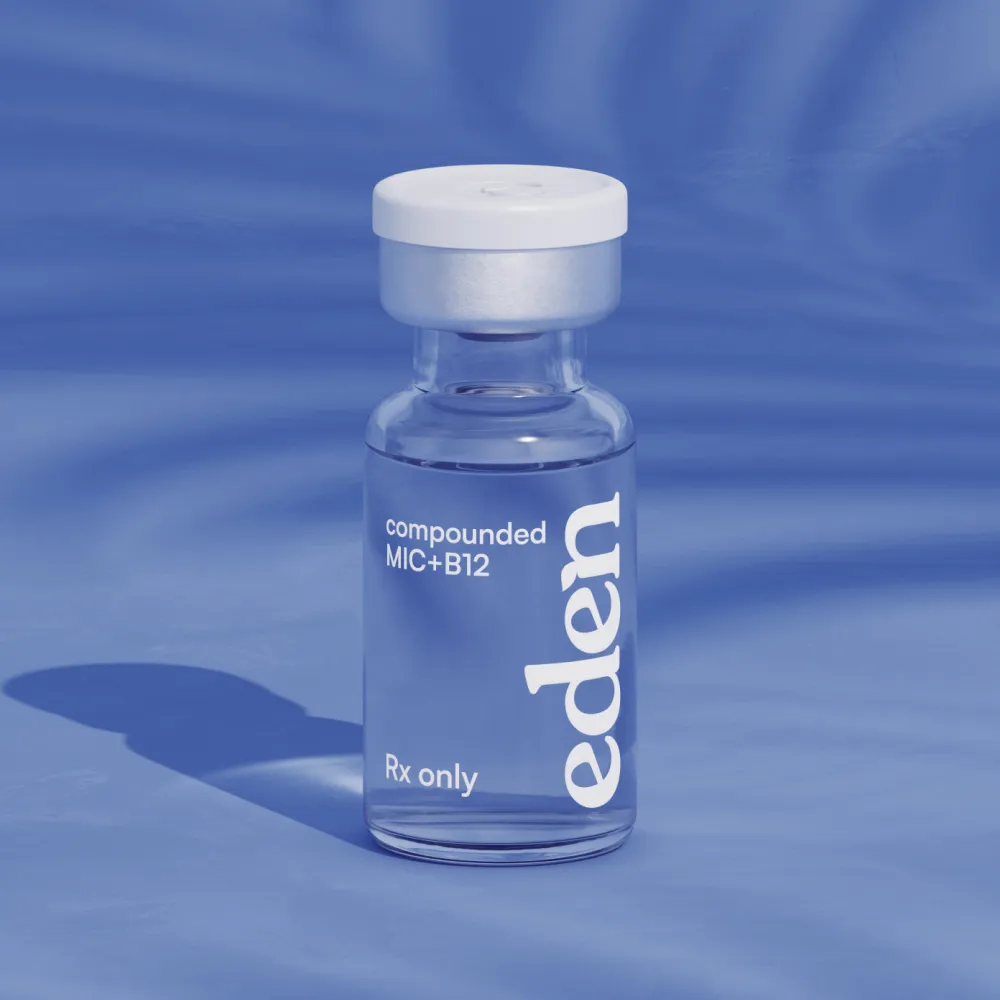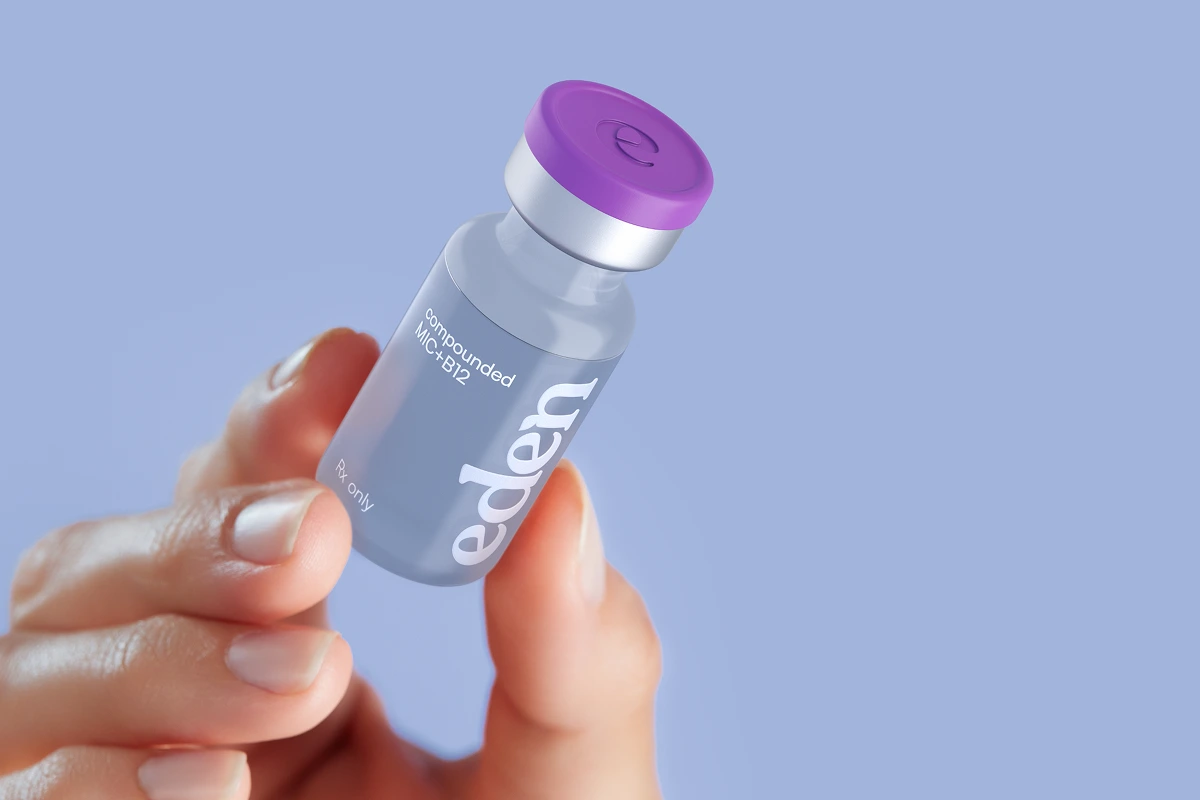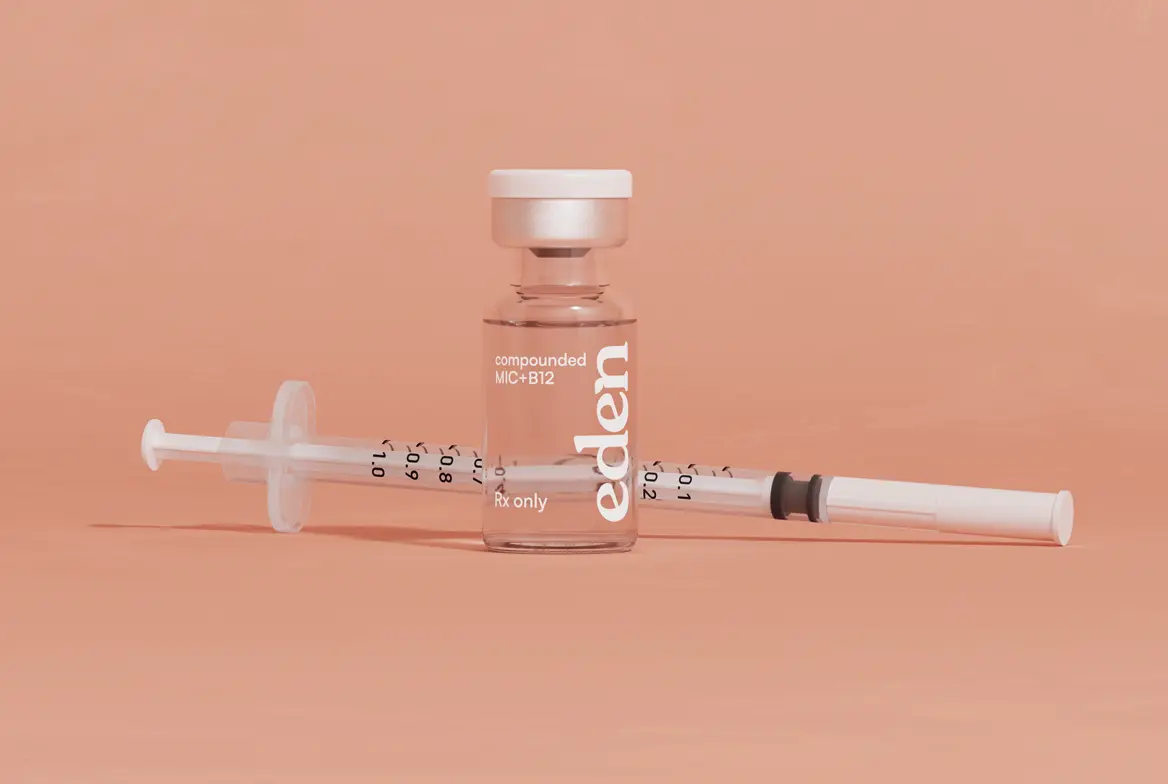MIC B12 vs B12: Discover The Key Differences


Dive into the differences between MIC B12 and regular B12 injections, exploring their unique components, potential benefits, and specific uses to help you choose the right supplement for your health goals.
- Vitamin B12 is an essential nutrient that plays a crucial role in various bodily functions, including red blood cell production, nervous system support, and metabolism regulation.
- MIC B12 is a combination of vitamin B12 and lipotropic compounds (Methionine, Inositol, and Choline) designed to enhance weight loss and boost energy levels.
- The main difference between B12 and MIC B12 lies in their composition. While B12 injections contain only vitamin B12, MIC B12 injections include additional active ingredients that may provide enhanced benefits for weight management and liver function.
- Both B12 and MIC B12 injections can help combat fatigue, improve energy levels, and support overall well-being. MIC B12 may offer additional advantages related to fat metabolism and energy levels.
- Methylcobalamin, a form of vitamin B12 used in some injections, is considered to be highly absorbable and better retained in the body compared to cyanocobalamin, another type of B12.
- The additional components in MIC B12 injections, such as methionine, inositol, and choline, have specific functions that may contribute to weight loss efforts and overall health improvement.
- When choosing between B12 and MIC B12 injections, it's important to consider individual health goals and whether the additional lipotropic compounds align with specific need.
- Both types of injections are generally recognized as safe, but it's crucial to consult with a healthcare provider before starting any supplementation regimen, especially for individuals with pre-existing medical conditions or those taking certain medications.

Have you ever wondered about the difference between B12 and MIC B12? These two vitamin supplements have gained attention for their potential health benefits, particularly in weight management and overall well-being. While both contain vitamin B12, a crucial nutrient for various bodily functions, they have distinct characteristics that set them apart. Understanding these differences is essential to make an informed decision about which supplement might be right for you.
This article delves into the key distinctions between B12 and MIC B12, exploring their composition, benefits, and applications. We'll examine the unique ingredients in MIC B12 injections, compare different forms of vitamin B12 such as methylcobalamin and cyanocobalamin, and discuss their potential impacts on health and wellness. By the end, you'll have a clearer understanding of these supplements and be better equipped to choose the one that aligns with your health goals.
Understanding MIC B12
MIC B12 shots for weight loss have gained recognition for their potential benefits in supporting metabolic functions and overall health. These injections combine essential nutrients, including Methionine, Inositol, Choline, and Vitamin B12, which play crucial roles in the human body.
The key ingredients in MIC B12 injections contribute to improved metabolic functions. They assist the body in breaking down fats and carbohydrates, thereby aiding in the process of weight loss. Methionine, Inositol, and Choline work together to metabolize fats and remove them from the liver, potentially contributing to weight reduction and improved liver health.
Vitamin B12, a vital component of these injections, is known to boost energy levels, which is crucial for those battling fatigue or dealing with strenuous physical activities. It helps the body use fats and carbohydrates for energy and make new protein, ultimately enhancing overall energy levels.
Additionally, Vitamin B12 and Inositol play a significant role in maintaining healthy nerve function. They can help improve signal transmission across nerve cells, which is essential for optimal brain and nervous system health.
Potential Side Effects
While MIC B12 injections are generally recognized as safe, some individuals may experience mild side effects. These can include swelling and redness at the injection site, upset stomach, or lightheadedness. In rare cases, more severe side effects such as allergic reactions may occur, causing symptoms like itching, hives, wheezing, and facial swelling.
Reviews
If you're searching for MIC B12 injections near me, many local clinics and wellness centers offer these injections to help boost metabolism, support weight loss, and increase energy levels. It's important to choose a reputable provider to ensure the injections are administered safely and effectively, tailored to your health needs.
Many users have reported positive experiences with MIC B12 injections. For instance, Jessica C. shared, "The process was super easy. I'm busy with 3 kids, a husband, and a full-time job, so feeling my best and having energy is a must for me!" Similarly, Robyn P. noted, "I have lost 17 lbs! I haven't lost that much at one time since I started menopause, and it's only been 3 months.
Cost
The cost of MIC B12 injections can vary depending on the provider and frequency of treatments. While specific pricing information is not provided in the given factual key points, it's important to note that these injections are typically more expensive than oral supplements. Many users find the potential benefits outweigh the cost, especially when considering the higher absorption rate compared to oral supplements.
An Overview of B12
Vitamin B12, also known as cobalamin, is an essential water-soluble vitamin that plays a crucial role in various bodily functions. It is naturally present in animal-based foods and can also be found in fortified products and dietary supplements. This vital nutrient is necessary for the development and proper functioning of the central nervous system, healthy red blood cell formation, and DNA synthesis.
B12 exists in several forms, with methylcobalamin and adenosylcobalamin being the metabolically active forms in the human body. These forms act as cofactors for two important enzymes: methionine synthase and L-methylmalonyl-CoA mutase. These enzymes are involved in crucial metabolic processes, including the metabolism of fats and amino acids.
The absorption of vitamin B12 is a complex process that begins in the mouth and continues through the digestive system. In food sources, B12 is bound to proteins and must be released before absorption. This process involves the action of hydrochloric acid and digestive enzymes in the stomach. Once freed, B12 binds to a protein called intrinsic factor, which is essential for its absorption in the small intestine.
For adults, the recommended dietary allowance (RDA) for vitamin B12 is set by the Food and Nutrition Board based on the amount needed to maintain healthy hematological status and serum vitamin B12 levels. The RDA varies depending on age and other factors, such as pregnancy and lactation.
Vitamin B12 deficiency can lead to various health issues, including fatigue, nerve damage, and neurological problems like depression and memory loss. Certain groups of people are at higher risk of B12 deficiency, including older adults, individuals with gastrointestinal disorders, and those following strict vegetarian or vegan diets.
To ensure adequate intake, individuals can obtain vitamin B12 from various sources, including animal products like meat, fish, eggs, and dairy. For those following plant-based diets or with absorption issues, fortified foods and dietary supplements can provide an alternative source of this essential nutrient.
{{primary-cta}}
MIC B12 vs B12: Key Differences
Difference #1: Composition
The primary difference between B12 and MIC B12 lies in their composition. B12 injections contain only vitamin B12, typically in the form of cyanocobalamin or methylcobalamin. On the other hand, MIC B12 injections blend vitamin B12 with additional essential nutrients, namely Methionine, Inositol, and Choline This combination of ingredients in MIC B12 is designed to enhance metabolic functions and support overall health.
Difference #2: Purpose and Benefits
While both B12 and MIC B12 injections aim to address vitamin B12 deficiency, MIC B12 offers additional potential benefits. B12 injections primarily focus on treating B12 deficiency, supporting red blood cell production, and maintaining nervous system health. MIC B12, however, extends its scope to include possible advantages for weight management, fat metabolism, and liver function. The lipotropic compounds in MIC B12 work together to metabolize fats and remove them from the liver, potentially contributing to weight reduction and improved liver health.
Difference #3: Absorption and Effectiveness
The absorption rates of B12 and MIC B12 injections differ significantly. Traditional B12 injections are absorbed directly into the bloodstream, with studies showing absorption rates between 55% and 97%. MIC B12 injections, due to their unique composition, may offer enhanced absorption and utilization of the nutrients. The combination of lipotropic compounds in MIC B12 is believed to improve the body's ability to break down fats and carbohydrates, potentially leading to more efficient metabolic processes.
Difference #4: Frequency of Administration
The frequency of administration varies between B12 and MIC B12 injections. B12 injections are typically administered every 3-6 months, depending on the individual's needs and B12 levels. MIC B12 injections, however, are often recommended on a more frequent basis, usually bi-weekly over a period of about 3 months. This difference in administration frequency is due to the additional compounds in MIC B12 and their intended effects on metabolism and weight management.
Difference #5: Target Audience
While B12 injections are primarily prescribed for individuals with vitamin B12 deficiency, MIC B12 injections cater to a broader audience. MIC B12 is often marketed towards individuals seeking weight loss support, increased energy levels, and improved liver function [2]. This expanded target audience reflects the additional potential benefits offered by the lipotropic compounds in MIC B12 injections.
Comparing MIC B12 and B12: Selection Criteria and Applications
When choosing between MIC B12 and B12 injections, it's essential to consider individual health goals and specific needs. The difference between B12 and MIC B12 lies primarily in their composition and intended purposes.
B12 injections are typically recommended for individuals with vitamin B12 deficiency. These injections provide a direct and efficient way to increase B12 levels in the body, supporting various essential functions such as red blood cell production, nervous system health, and DNA synthesis. B12 shots are highly effective for those struggling to absorb vitamin B12 from food or oral supplements.
On the other hand, MIC B12 injections offer a more comprehensive approach. In addition to vitamin B12, they contain lipotropic compounds (Methionine, Inositol, and Choline) that may provide additional benefits. MIC B12 injections are often considered by individuals seeking support for weight management, increased energy levels, and improved liver function.
The selection criteria for choosing between these two options depend on specific health targets. Those primarily concerned with addressing B12 deficiency may find traditional B12 injections sufficient. Individuals looking for potential weight loss support and enhanced metabolic function might consider MIC B12 injections.
It's important to note that while B12 injections focus on treating B12 deficiency, MIC B12 injections have a broader scope. The additional components in MIC B12 are designed to metabolize fats and remove them from the liver, potentially contributing to weight reduction and improved liver health.
The frequency of administration also differs between the two. B12 injections are typically given every 3-6 months, while MIC B12 injections are often recommended on a more frequent basis, usually bi-weekly over about three months.
When considering these options, it's crucial to consult with a healthcare provider. They can assess individual needs, health status, and potential risks or interactions with existing medications. Both types of injections are generally recognized as safe, but professional guidance is essential for determining the most appropriate choice and dosage.
{{primary-cta}}
Sources and Availability of MIC B12 Supplements
MIC B12 supplements are available from various sources, including online retailers, health stores, and specialized pharmacies. These supplements come in different forms, such as injections, oral tablets, and liquid drops, catering to diverse preferences and needs.
When searching for MIC B12 supplements, it's essential to consider the source of vitamin B12 used. Cyanocobalamin and methylcobalamin are the two primary forms found in supplements. Cyanocobalamin (sometimes included in semaglutide formulations) is a synthetic form of vitamin B12, not found in nature, but widely used in supplements due to its stability and cost-effectiveness. Methylcobalamin, on the other hand, is a naturally occurring form of vitamin B12 that can be obtained through both supplements and food sources like fish, meat, eggs, and milk.
The choice between cyanocobalamin and methylcobalamin depends on individual needs and preferences. Some healthcare providers may recommend methylcobalamin for its bioavailability, while others may suggest cyanocobalamin for its stability.
When selecting a MIC B12 supplement, it's crucial to consider factors such as quality, third-party testing, and certifications. Look for products from reputable manufacturers that undergo rigorous testing to ensure purity and potency. Some supplements may also carry certifications like NSF Certified for Sport, which verifies supplement contents and ensures they are free from unsafe levels of contaminants.
For those seeking a reliable source of MIC B12 supplements, Eden offers a range of options. Eden’s online platform provides access to high-quality MIC B12 products, including injections and oral supplements. When purchasing from Eden, customers can benefit from the convenience of online shopping while accessing products from reputable manufacturers.
It's important to note that dietary supplements, including MIC B12, are minimally regulated by the FDA. Therefore, it's crucial to consult with a healthcare provider before starting any new supplement regimen. They can provide guidance on the most suitable form and dosage based on individual health needs and potential interactions with other medications or supplements.
Final Thoughts
The exploration of MIC B12 and B12 supplements sheds light on their unique characteristics and potential benefits. While both contain essential vitamin B12, MIC B12's additional components offer a broader range of potential advantages, particularly for those aiming to boost their metabolism and support weight management efforts. The choice between these supplements depends on individual health goals and needs, highlighting the importance of personalized healthcare decisions.
When considering these supplements, it's crucial to consult with a healthcare provider to determine the most suitable option. They can provide guidance on dosage, potential side effects, and interactions with other medications. Remember that while these supplements can be valuable tools for health and wellness, they should be part of a comprehensive approach that includes a balanced diet and regular exercise to achieve optimal results.

Blog Components



The FDA does not approve compounded medications for safety, quality, or manufacturing. Prescriptions and a medical evaluation are required for certain products. The information provided on this blog is for general informational purposes only. It is not intended as a substitute for professional advice from a qualified healthcare professional and should not be relied upon as personal health advice. The information contained in this blog is not meant to diagnose, treat, cure, or prevent any disease. Readers are advised to consult with a qualified healthcare professional for any medical concerns, including side effects. Use of this blog's information is at your own risk. The blog owner is not responsible for any adverse effects or consequences resulting from the use of any suggestions or information provided in this blog.
Eden is not a medical provider. Eden connects individuals with independent licensed healthcare providers who independently evaluate each patient to determine whether a prescription treatment program is appropriate. All prescriptions are written at the sole discretion of the licensed provider. Medications are filled by state-licensed pharmacies. Please consult a licensed healthcare provider before making any medical decisions.
Thank you!
We'll be in touch.
Thank you!
























